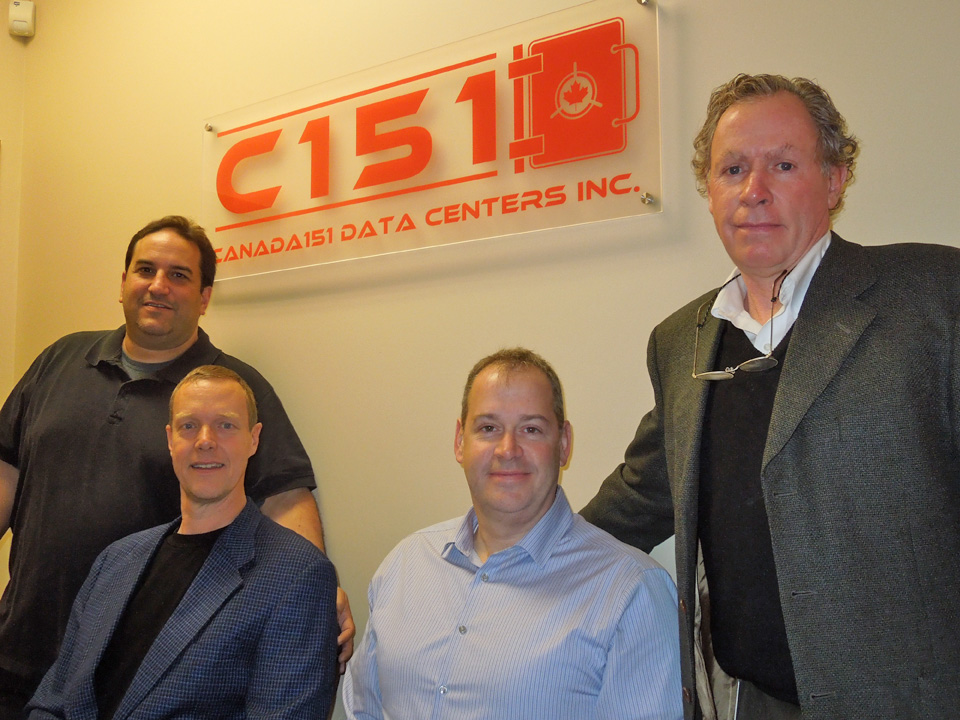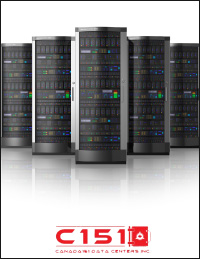High-end, secure service at a mid-market price
By Cheryl Long
Savvy consumers know that researching cell phone plans or Internet providers is the best way to nail down that ideal combination of price and service. The same holds true in the corporate world, particularly when it comes to protecting one of the most important components of any businesses — its data.
Canada151 Data Centers Inc. (C151) knew that they could provide a unique combination of great customer service, highly secure and redundant space, power and fibre connectivity in a convenient location, at a reasonable price. Data centres are all about “uptime” or, conversely, how frequently servers are not available to users. Virtually all businesses use servers for data storage, back and front office operations, transaction processing and other mission critical activities. Uptime is largely impacted by the degree of redundancy built into the power supply and fibre connections. Two redundant pieces of critical equipment, two fibres and two sources of power are better than one. Downtime can be very expensive and very likely as the grid does fail from time to time and singular pieces of equipment can also fail or fibre networks can go down.
C151 welcomes customers who want the quality of a large IT/telecom company without the substantial price tag or additional unwanted services. Though the company is relatively new, they’ve already honed in on three values that make a data centre successful: focus, flexibility and redundancy.
“We just simply provide a very secure, highly redundant physical premise, conveniently located within 15 minutes of downtown, and great customer service at a fair price,” said company founder and CEO Mark MacDonald.
No one disputes the importance of backing up data, whether it’s a customer list or the company’s financial records, and there are still businesses that maintain their own server rooms on premise and back up sporadically. This exposes them to a variety of risks, many beyond their control, including power outages with no back-up power source, fibre connectivity disturbances and heat-related issues due to minimal cooling resources. Experts indicate such events can cost a business upwards of $500,000 per 60-minute event, which they say will statistically happen once a year.
By going with a primary and back-up plan that includes offsite server locations (such as C151) that feature high levels of physical security, built-in power redundancies, connectivity from multiple fibre providers and on-site power generation, the odds of material downtime and losing valuable data are very significantly minimized.
Location ideal for recovery services
C151 is centrally located in Toronto, about 15 minutes from either the downtown core or Toronto Pearson International Airport. The location’s easy access and ample parking is also ideal for clients using their Worksite Recovery facilities, which provides office space and conference rooms in the event of disaster affecting the company’s office and IT accessibility. Though it seems unlikely, this is exactly the type of situation faced by businesses in downtown Toronto during the G20 summit protests in 2010. Not only is business interruption inconvenient but the ensuing losses can be difficult to recover, if at all.
On a day-to-day basis, C151 excels in its ability to provide premier colocation services at a mid-market price. Recognizing that building and maintaining IT equipment in-house can be costly for many companies, C151 offers customers secure, lockable cabinets or cages for all of their IT assets, a high-performance, high availability Internet bandwidth network customized to their needs, and a secure power source.
“We act as a trusted advisor, speaking in the clients’ language and translating their needs into the ideal technical solution. It can simply be secure space, highly redundant power and connectivity or a managed service delivered by one of our partners. The Cloud is a game changer, but it has also led to a great deal of confusion. We speak business and tech and help bridge the gap to build an ideal solution for our customer,” said Joe Damiani, the company’s Vice-President.
Many companies have realized that operating and maintaining IT hardware is not one of their core competencies, and have made the decision to outsource that role to a data centre. As one example, C151 is working with a large multi-national manufacturer that made the decision to outsource, allowing them to focus on the ERP systems they use to supply products to consumers. That decision means they can dedicate more of their internal resources to their customers, MacDonald said. Other businesses decide to outsource for a multitude of reasons, whether they’re scaling up and don’t want to invest in additional hardware or they operate out of location that loses power on a regular basis. Colocation services are highly secure, always available and scalable based on a company’s needs.
Complete solutions for clients
Though C151 focuses primarily on colocation, they often deal with clients who need additional services and that’s why the company has forged solid relationships with several partners. They work closely with value-added resellers, managed service providers and Cloud partners to deliver complete solutions to their clients. This allows C151 to offer clients a “one-stop shop” that delivers best of breed, tailored solutions best suited to their IT needs.
That’s important in a landscape that has been shrinking over the past few years as larger telecommunication companies in Canada have moved back into the data centre space, Damiani said. “There has been a good deal of consolidation in the market and what remains are either big telco with lots of products but limited creativity or agility, or the lower end of the space where you have providers who offer low price with limited uptime,” he explained. “We saw it as a perfect opportunity for launching C151, providing flexible solutions with our partners with a higher level of uptime at an affordable cost.
“The market is defined by the degree of redundancy that you’ve got in your equipment architecture because it truly defines how much uptime you can provide. If you only have one backup generator versus two, odds are you will be down more,” MacDonald explained. “The business is very capital intensive and you have to make the right investment in power, fibre and cooling infrastructure in order to provide that high quality uptime. Our goal is and always will be to provide that very high level of uptime at a reasonable price, with great service, for medium-sized and small businesses.”
Data storage affected by privacy laws
Storing data with a Canadian-based company isn’t just about convenience. With the launch of Cloud-based storage, consumers and companies alike began finding it easier than ever to process and back up their data. But the Cloud can be anywhere, and few people truly understand exactly where their personal information is being contained, MacDonald explained. Where it gets tricky is in the area of laws governing privacy of information, which differ from country to country. Data that is stored offsite falls under the laws of the country providing the storage, and many Cloud providers are located in the United States and overseas. If a Canadian company finds its data accessed by unauthorized users in another country (government or otherwise), they are liable under Canadian law for the breach. By using a data centre like C151, there’s no question that data is being stored in Canada and is being protected by Canadian laws.
“What we can state unequivocally, however, is that the data you store with us is in Canada. You put it with a large cloud provider, such as AWS or Azure, you have no idea. It’s all about risk assessment and risk mitigation,” MacDonald said. “Depending on the type of information being stored, companies and their boards should be very concerned about where company data is being stored and who can access it. Storage in the Cloud doesn’t allow you do that with certainty. Storing data in Canada, on dedicated servers in a secure data centre, can provide companies with certainty concerning laws governing third party accessibility to that data.”
Growth is on the horizon for C151, particularly as the sheer volume of data worldwide continues to increase. Over the next five years, MacDonald would like to see the C151 Toronto location substantially filled and expand to other major centres across Canada, such as Vancouver and Ottawa, whether through acquisition or new build.
“With the growth of Cloud, Internet of Things, massive amounts of data are expected to be generated over the next 10 years. That data, the Cloud, all lives on infrastructure, sitting in a data centre like ours, somewhere in world,” Damiani said.
For more information about C151 Data Centers Inc., visit www.canada151datacenters.com.







